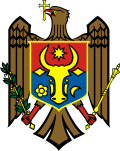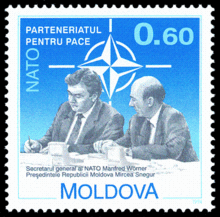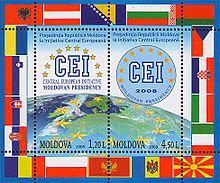- Foreign relations of Moldova
-
Moldova 
This article is part of the series:
Politics and government of
MoldovaConstitutionParliamentJudiciaryExecutiveDivisionsElectionsForeign policy
After achieving independence from the Soviet Union, Moldova had established relations with other European countries. A course for European Union integration and neutrality define the country's foreign policy guidelines.
In 1995 the country became the first post-Soviet state admitted to the Council of Europe. In addition to its participation in NATO's Partnership for Peace program, Moldova is also a member state of the United Nations, the OSCE, the North Atlantic Cooperation Council, the World Trade Organization, the International Monetary Fund, the World Bank, the Francophonie and the European Bank for Reconstruction and Development.
In 2005 Moldova and EU established an action plan that sought to improve the collaboration between the two neighboring structures.
After the War of Transnistria, Moldova had sought a peaceful resolution to the conflict in the Transnistria region by working with Romania, Ukraine, and Russia, calling for international mediation, and cooperating with the OSCE and UN fact-finding and observer missions.
Contents
Relations with the European Union
Moldova currently aspires to join the European Union[1] and is implementing its first three-year Action Plan within the framework of the European Neighbourhood Policy (ENP) of the EU.[2]
Relations with NATO
NATO relations with Moldova date back to 1992, when the country joined the North Atlantic Cooperation Council. Moldova works alongside NATO Allies and Partner countries in a wide range of areas through the Partnership for Peace and the Euro-Atlantic Partnership Council.
Relations with Romania
Main article: Romanian-Moldovan relationsMoldova's relations with its western neighbour, Romania, have been sinuous since 1994. Most of Moldova was part of Romania during the interwar period (1918–40) and linguists generally agree that the Moldovan language is in fact identical with Romanian. However, Moldovans have been ambivalent about whether they consider themselves Romanians or Moldovans. Early signs that Romania and Moldova might unite after both countries achieved emancipation from communist rule quickly faded. Romania remains interested in Moldovan affairs, especially that country's civil conflict with the breakaway republic of Transnistria. However, the two countries have been unable even to reach agreement on a basic bilateral treaty; Romania is insistent (against determined Moldovan resistance) that such a treaty would have to refer to Romania and Moldova's 'special relationship'. Since 1994, the two countries enjoyed a visa-free arrangement that ended on January 1, 2007, with Romania's entry into European Union. This prompted many Moldovan citizens to apply for Romanian citizenship.[3]
Relations with Russia and other post-Soviet states
Main article: Moldovan-Russian relationsThe Moldovan Parliament approved the country's membership in the Commonwealth of Independent States and the CIS charter on economic union in April 1994. Moldova however has never participated in any military aspects of CIS, citing its neutrality status.
In 1998 Moldova contributed to the founding of GUAM, a regional cooperation agreement made up of Georgia, Ukraine, Azerbaijan and Moldova. Although the agreement initially included a declaration of mutual defense, Moldova has since declared its disinterest in participating in any GUAM-based mutual defense initiative.
Russia continues to maintain military presence in the Transnistrian region of Moldova, despite previous agreements with Moldova and within OSCE and CAF to withdraw its troops and ammunition.
Separatist movements
The territory of Moldova includes the separatist Transnistria region. Transnistria had a particularly large non-Moldovan population (ca. 60%) and broke away from Moldova less than a year after Moldova became independent at the fall of the Soviet Union. It has its own de facto government and acts independently from Chişinău since the War of Transnistria. The international diplomatic situation with respect to the question of Transnistria determines and is determined by Moldova's relations with Russia. Russia, Ukraine, OSCE, EU, and United States are involved at different degrees in the conflict resolution.
Bilateral relationships
Moldova has embassy-level relationships with:
- Austria, Belarus, Belgium, Bulgaria, France, Germany, Greece, Hungary, Italy, Latvia, Poland, Portugal, Romania, Sweden, Ukraine, the United Kingdom in Europe (excl. Russia and Turkey)
- Azerbaijan,[4] the People's Republic of China, Israel, the Russian Federation, Turkey and the United States, outside Europe
- Representation Delegation of the European Union, the United Nations (in Geneva and New York City), the Council of Europe (Strasbourg), and the OSCE (Vienna).
Country Formal Relations Began Notes  Armenia
Armenia- Armenia is represented in Moldova through its embassy in Kiev (Ukraine).
- Moldova is represented in Armenia through its embassy in Moscow (Russia).
- There are around 7,500 people of Armenina descent living in Moldova.
- Armenian Ministry of Foreign Affairs: presentation of the Moldovan ambassador’s credentials to the Armenian Foreign Minister
- Moldovan Ministry of Foreign Affairs: list of bilateral treaties with Armenia
 Austria
Austria1992-03-25 see Austria–Moldova relations  Belarus
Belarussee Belarus–Moldova relations There is no common border between Moldova and Belarus. The number of Belarusians in Moldova and of Moldavians in Belarus is insignificant.
 Belgium
Belgium- Moldova has an embassy in Brussels.
- Trade is modest between Moldova and Belgium .for the year 2005: 44.7 million USD was traded between the two countries increasing by 33.4% compared to the year 2004 [6]
- Embassy of the Republic of Moldova in Belgium
- Belgian Embassy in Bucharest (French)
- Ministry of Foreign Affairs of the Republic of Moldova
- Belgian Federal Public Service Foreign Affairs, Foreign Trade and Development Cooperation
 Bulgaria
Bulgaria1992-02-05 - Bulgaria recognized Moldova on December 28, 1991.
- Since 1992, Bulgaria has an embassy in Chişinău.[7]
- Moldova has embassy in Sofia.[8]
- Both countries are full members of the Council of Europe and of the Organization for Security and Co-operation in Europe.
 Croatia
Croatia1992-07-28 - Moldova has recognised the independence of the Republic of Croatia on May 29, 1992.
- Croatia is represented in Moldova through its embassy in Bucharest (Romania).
- Moldova is represented in Croatia through its embassy in Budapest (Hungary).
- Croatian Ministry of Foreign Affairs and European Integration: list of bilateral treaties with Moldova
- Moldovan Ministry of Foreign Affairs and European Integration about relations with Croatia
 Cyprus
Cyprus1992-02-12  Czech Republic
Czech Republic- Czech Embassy, Chişinău
 Denmark
Denmark1992-01-20 See Denmark–Moldova relations  Estonia
Estonia1992-11-10 - Before 1918, both countries were part of the Russian Empire and before 1991 both countries were part of the USSR.
- Moldova recognized Estonia on August 28, 1991
- Estonia recognized Moldova on February 20, 1992.
- Estonia is represented in Moldova through its embassy in Kiev (Ukraine) and through an honorary consulate in Chişinău. * Moldova is represented in Estonia through its embassy in Riga (Latvia).
- Both countries are full members of the Council of Europe.
- Estonian Ministry of Foreign Affairs about the relation with Moldova
- Moldovan Ministry of Foreign Affairs about the relation with Estonia
 Finland
Finland1992-02-26 - Finland recognised Moldova's independence on December 30, 1991.
- Finland is represented in Moldova through its embassy in Bucharest, Romania.
- Moldova is represented in Finland its embassy in Stockholm, Sweden.[9]
- Ministry for Foreign Affairs of Finland about relations with Moldova
 France
France- France opened an Embassy in Chişinău
- When visiting the respective country, a mutual visa obligation exists for both nationals for any border crossing, except for transfer passengers.
- A lot of French companies invest in Moldova. France Telecom with Orange as GSM operator. Or also Société Générale with Mobias Banca. There are also a lot of IT companies offshores in Chişinău.
- Embassy of the Republic of Moldova in Paris
- French Embassy in Chisinau
- Ministry of Foreign Affairs of the Republic of Moldova
- French Ministry of Foreign and European Affairs
 Georgia
Georgia1992-06-25 - Until 1991, both countries were part of the USSR and before 1918 part of the Russian empire.
- Georgia is represented in Moldova through its embassy in Bucharest (Romania). Moldova is represented in Georgia through its embassy in Baku (Azerbaijan).
- Georgian Ministry of Foreign Affairs about relations with Moldova
 Germany
Germanysee Germany–Moldova relations Germany has an embassy in Chişinău. Moldova has an embassy in Berlin.
 Hungary
Hungary- Hungarian Embassy, Chişinău
 Ireland
Ireland1992 - Ireland is represented in Moldova through its embassy in Bucharest (Romania).[10]
- Moldova is represented in Ireland through its embassy in London (United Kingdom).[11]
- Both countries are full members of the Council of Europe.
- Moldovan Ministry of Foreign Affairs about relations with Ireland
 Israel
Israel1992-06-22 see Israel–Moldova relations  Italy
Italy- Italy opened an Embassy in Chişinău.
- The Italian ambassador to Moldova with residence in Bucharest is Daniele Mancini.
- Embassy of the Republic of Moldova in Rome
- Italian Embassy in Bucharest
- Ministry of Foreign Affairs of the Republic of Moldova
- Italian Ministry of Foreign Affairs
 Japan
Japan1992-03-16 see Foreign relations of Japan  Lithuania
Lithuania- Lithuanian Embassy, Chişinău
 Malta
Malta- Malta is represented in Modova through a non resident embassy based in Valletta (in the Foreign Affairs Ministry).
- Moldova is represented in Malta through its embassy in Rome (Italy).
- Direction of the Maltese representation in Moldova
- Direction of the Moldovan representation in Malta
- Moldovan Ministry of Foreign Affairs and European Integration about the relation with Malta
 Poland
Poland- Polish Embassy, Chişinău
 Romania
RomaniaSee Moldovan–Romanian relations  Russia
Russiasee Moldova–Russia relations Relations between Moldova and Russia deteriorated in November 2003 over a Russian proposal for the solution of the Transnistrian conflict, which Moldovan authorities refused to accept. In the following election, held in 2005, the Communist party made a formal 180 degree turn and was re-elected on a pro-Western platform,[citation needed] with Voronin being re-elected to a second term as president.
 Serbia
Serbia1995 - Moldova is represented in Serbia through its embassy in Sofia (Bulgaria).
- Serbia is represented in Moldova through its embassy in Kiev (Ukraine).
- Serbian Ministry of Foreign Affairs about relations with Moldova
 Slovenia
Slovenia1993-10-27 - Both countries are represented in each other through their embassies in Budapest (Hungary).
- Both countries are full members of the Council of Europe and the Francophonie.
 Turkey
Turkey- Moldova has an embassy in Ankara.
- Turkey has an embassy in Chişinău.
- Both countries are full members of BSEC.
- There are around 11,000 Turks who live in Moldova.
- Moldovan embassy in Ankara
- Turkish Ministry of Foreign Affairs about relations with Moldova
 United Kingdom
United Kingdom- United Kingdom opened a British Embassy, Chişinău.[12]
- Embassy of The Republic of Moldova to United Kingdom of Great Britain and Northern Ireland
- Ministry of Foreign Affairs of the Republic of Moldova
 United States
United States1991-12-25 see Moldova – United States relations - Embassy of the United States to Moldova
- Moldovan Embassy, Washington, D.C.
The United States recognized the independence of Moldova on December 25, 1991 and opened an Embassy in its capital, Chişinău, in March 1992. A trade agreement providing reciprocal most-favored-nation tariff treatment became effective in July 1992. An Overseas Private Investment Corporation agreement, which encourages U.S. private investment by providing direct loans and loan guarantees, was signed in June 1992. A bilateral investment treaty was signed in April 1993. Generalized system of preferences status was granted in August 1995, and some Eximbank coverage became available in November 1995.
See also
Gallery
-
Flag of Moldova on the background of UNO’s emblem and the Statue of Liberty.
-
Flag of Moldova on the background of CSCE seat.
References
- ^ Moldova will prove that it can and has chances to become EU member, Moldpress News Agency, June 19, 2007
- ^ Moldova-EU Action Plan Approved by European Commission, December 14, 2004, retrieved July 2, 2007
- ^ Cetatenia romana, portita spre Europa December 27, 2006
- ^ http://www.tur.md/eng/foreignembassy/112/
- ^ "Relations with Austria". Moldovan Ministry of Foreign Affairs and European Integration. http://www.mfa.gov.md/foreign-policy/at_en/. Retrieved 2009-05-07.
- ^ http://www.ambasadamoldova.be/bilateral/bel_en.htm
- ^ Bulgarian embassy in Chişinău
- ^ Moldovan Ministry of Foreign Affairs about relations with Bulgaria
- ^ http://formin.finland.fi/public/default.aspx?nodeid=17267&contentlan=2&culture=en-US
- ^ Irish embassy in Bucharest (also accredited to Moldova)
- ^ Moldovan embassy in London (also accredited to Ireland)
- ^ British Embassy in Chisinau
 Foreign relations of Moldova
Foreign relations of Moldova
Foreign relations of European countries Sovereign
states- Albania
- Andorra
- Armenia
- Austria
- Azerbaijan
- Belarus
- Belgium
- Bosnia and Herzegovina
- Bulgaria
- Croatia
- Cyprus
- Czech Republic
- Denmark
- Estonia
- Finland
- France
- Georgia
- Germany
- Greece
- Hungary
- Iceland
- Ireland
- Italy
- Kazakhstan
- Latvia
- Liechtenstein
- Lithuania
- Luxembourg
- Macedonia
- Malta
- Moldova
- Monaco
- Montenegro
- Netherlands
- Norway
- Poland
- Portugal
- Romania
- Russia
- San Marino
- Serbia
- Slovakia
- Slovenia
- Spain
- Sweden
- Switzerland
- Turkey
- Ukraine
- United Kingdom
- Vatican City
States with limited
recognition- Abkhazia
- Kosovo
- Nagorno-Karabakh
- Northern Cyprus
- South Ossetia
- Transnistria
Dependencies
and other territories- Åland
- Faroe Islands
- Gibraltar
- Guernsey
- Jan Mayen
- Jersey
- Isle of Man
- Svalbard
Other entities - European Union
- Sovereign Military Order of Malta
Categories:
Wikimedia Foundation. 2010.





